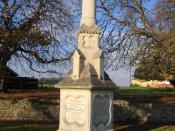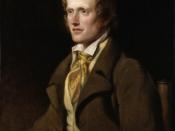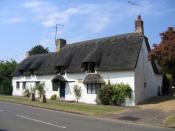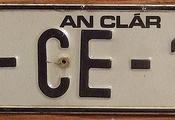John Clare was a self-taught writer during the Romantic period. He was born in 1793 to an impoverished family in Helpston, Northamptonshire. He died in 1864. His father was a labourer with little literacy and his mother was completely illiterate. John Clare had a little more than the basic schooling that gave him the ability to read and write. From a young age he had a love for poetry. He wrote his poetry the way he saw life, and in his style. This is what makes the work of John Clare so unique when compared to other writers of his time. John Clare's style of writing received much criticism during his time. The reception he received was not as positive as he had hoped. Sales were not as high as he wanted and slowly there were very few sales at all. Many social issues effected John Clare including, class prejudice, poverty, and most importantly the enclosure movement.
Despite these obstacles John Clare continued to write poetry. His poetry reflects a variety of struggles' people faced during his time. Although he received little recognition during his life John Clare's writing is now slowly starting to be appreciated The style in which John Clare writes is what makes his writing truly unique. Almost all of his manuscripts were written without punctuation. This lack of punctuation is what makes his writing so different and enjoyable. Clare's lack of punctuation portrays his relationship, experience, and amazement with nature. The failure to punctuate also give a sense of freedom and openness. His misspellings convey a sense of place. Johanne Clare describes that, "Clare's language was essential to the sense of place that he sought to convey."ÃÂ (Clare 120) By leaving out punctuation John Clare portrayed the freedom, flow and open space of nature. During this time there were many criticisms towards Clare's lack of punctuation. Many critics considered Clare's language "coarse, vulgar, radically low and insignificant."ÃÂ (Clare 128) As a result Clare's poems were changed before publication. Editors added punctuation and changed some his dialect. John Taylor, Clare's publisher, "found it necessary to correct the punctuation, grammar errors and alter many of Clare's dialect words."ÃÂ (Clare 118) "Clare insisted to his publisher John Taylor that he would continue to write in his own language, dialect, and idiosyncratic grammar."ÃÂ (Drabble 202) It is important to understand that Clare's use of dialect was important to the contents of his poetry. Clare's dialect "reflects the individual character of the poet."ÃÂ (Clare 124) When Clare's poetry was changed it was no longer the work of John Clare. It became the interpretation of the person who edited and punctuated Clare's work. The real John Clare becomes lost in the punctuation and new dialect. The question remains why Clare's writing was punctuated and changed? It is shown that many critics were offended by Clare's writing technique: "Thus, if Clare's dialect words gave offence to many of his critics it was not because they bespoke a sensibility that was too decidedly local or provincial, but because they who was too obviously, too unabashedly working-class."ÃÂ (Clare 127) Since John Clare did not have the same knowledge and education as many other poets he was not as well respected by critics. His reputation as an "uneducated poet caused many of his contemporaries to argue that because he had not gone to a proper school he was simply incapable of creative and intellectual work."ÃÂ (Clare 116) When Poems Descriptive of Rural Life and Scenery was first published in 1820, "the title page described the author as "ÃÂJohn Clare a Northampton Peasant.'"ÃÂ (Stapleton 169) John Clare "never learned how to spell correctly or how to punctuate his poetry and prose"ÃÂ (Clare 118). He believed that education was not the most important part of being a great writer. In Clare's writing about education it appears that Clare believed that, "formal education or lack of it, had no bearing upon a person's capacity for creative achievement."ÃÂ (Clare 115) Even though Clare was poor and seen as a peasant poet he continued to write the way he wanted.
Not only were his poems criticized for lack of punctuation and grammar skills, he also received criticism due to his lack of education. Clare's poems were questioned on the basis that, "an uneducated man could not possibly have written them."ÃÂ (Clare 116-7) Johanne Clare points out that we can not regard Clare as uneducated. Reasons being that "today uneducated does not appear to be an adequate term to apply to a man who was a professional writer, a knowledgeable naturalist, a hobbyist in mathematics, something of an antiquarian, and, by any standards, a well-read student of English pastoral and descriptive poetry."ÃÂ (Clare 116) Although Clare lacked formal education he had a wide variety of knowledge in many areas. The life and writing of John Clare show that to be a good writer you do not have to be the smartest or most educated person. John Clare proves that creativity is more important than education. Although he was not well educated John Clare continued to write poems despite the many criticisms he received.
Along with criticism concerning Clare's writing he also dealt with a variety of social pressures during his life. John Clare dealt specifically with many social issues during his life. One of the main issues that directly affected Clare was the enclosure movement. With the enclosure movement the land of Clare's home in Helpston changed. After 1820 the enclosure movement divided the land into a grid like pattern. This movement completely changed the countryside where John Clare lived. It is obvious that, "John Clare was against the various changes that occurred during his lifetime."ÃÂ (Goodridge 22) Especially those changes that occurred during the enclosure movement Clare made many poetic comments to the enclosure movement and the chaos it caused: But now alas my charms are done For shepherds and for thee The cowboy with his green is gone And every Bush and tree Dire nakedness oer all prevails Yon fallows bare and brown Is all beset wi' post and rails And turned upside down. (Goodridge 164) In this poetic comment Clare makes his feelings towards enclosure quiet clear. It turned his world "upside down, and he deeply resented such a process."ÃÂ (Goodridge 164) Clare saw the enclosure movement as a negative factor in his life, and in the lives of those around him. The style in which Clare writes reflects his feelings towards nature and the enclosure movement. The lack of punctuation leaves his writing open and free, the way he thought the land should be left. Clare's writing reflected the views of many people towards the enclosure movement. Through his writing Clare describes the concerns of the people around him and how changes in social life affected those people.
During his life John Clare dealt with a variety of obstacles as a writer. He dealt with the criticisms of publishers and the change in his homeland with the enclosure movement. He received a large amount of publicity and recognition from his poetry in a very short time. After Clare's first published piece was released he received a large amount of recognition. Poems Descriptive of Rural Life and Scenery sold one thousand copies in two months. By 1821 four editions had been printed. Unfortunately Clare's immediate success would not last long. Johanne Clare describes how "John Clare passed out of the mind of the reading public almost as quickly as he passed in."ÃÂ (Clare 33) In 1822 The Village Minstrel was published and did not sell very well. In 1827 The Shepherd's Calendar hardly sold at all. His last book The Rural Muse, published in 1835 was scarcely noticed. The interest in a peasant poet soon wore off and he disappeared out of the spotlight as a writer. In 1837 Clare was admitted to an asylum. John Clare would now spend the rest of his years in an asylum.
What contributed to his illness is for the most part unclear. Margaret Drabble describes that, "declining sales of Clare's work may have contributed to his troubles."ÃÂ (Drabble 202) Many other circumstances of his life may have also contributed to his problems and feelings of depression. Including the change in his homeland with the enclosure movement. Clare's life in the asylum was not completely restricted. Clare was treated "kindly in the asylum, and was encourage to continue his writing verses."ÃÂ (Abrams 877) Some say that Clare's greatest poems are those written before his asylum years. Clare's poetry before the asylum is full of joy and happiness. His poetry during the asylum years becomes very dark and depressing. Others say that his best poetry was written during his life in the asylum. "Some of his best achievements are the poems composed during his madness."ÃÂ (Abrams 877) The poetry written before the asylum years focuses more on the "beauty of the natural landscape and country life."ÃÂ (Clare 10) From these poems Clare was considered a true nature poet. It is believed that, "no other poet has Clare's wealth of accurate observations and naturalist's knowledge."ÃÂ (Tibble xiii) He had a way of describing nature that no other poet had. John Clare had the ability to dissolve himself with nature, become the smallest organism and write from the perspective of that organism or animal.
To conclude, John Clare did not receive the acknowledgment he deserved during his lifetime. He did not receive the proper recognition as a writer due to his lack of education and his style of writing. Today Clare is recognized as a "poet of great truth and power and more attention is being paid to his highly personal evocations of landscape and place."ÃÂ (Drabble 202) The work of John Clare has remained little read until this century when various new additions of his poetry, autobiographical prose, and letters were made available, together with previously unpublished work Today the punctuated versions of Clare's poetry are being replaced by the original unpunctuated versions. John Clare is now being recognized as a true poet. The original poems John Clare wrote are now being published and his true self is now being seen. The work of John Clare may not have been appreciated during his time, but today he his slowly receiving his place in literary history. As more people become aware of his true work Clare will become a larger, well-known poet. John Clare will eventually be seen as a poet who contributed to the history of poetry by developing his own unique style and not conforming to the criticisms of others.
Works Cited Abrams, M. H. ed., The Norton Anthology of English Literature. New York, London: W. W. Norton & Company, 1993.
Clare, Johanne. John Clare and the Bounds of Circumstance. McGill-Queen's University Press, 1987.
Drabble, Margaret. The Oxford Companion to English Literature. Oxford University Press, 1985.
Goodridge, John. The Independent Spirit: John Clare and the self-taught tradition. Published by the John Clare Society, Helpston, and the Margaret Grainger Memorial Trust, 1994.
Tibble, J. W and Tibble, Anne ed., John Clare: Selected Poems. Dent: London, Everyman's Library, 1965.





